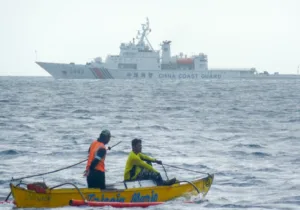Midway is a magnificent movie about the 1942 naval and aerial battle that blocked further Japanese aggression in the Pacific. Many reviewers have been negative because the film is not cynical or angst-ridden or politically correct. At one point, an emotionally distraught airman confesses his unreadiness for combat. He’s curtly told he can’t be spared so saddle up. This sense of duty common to the WWII generation is strange territory to many today.
Thanks partly to the ingenuity of American code breakers who decrypted Japanese messages, the Japanese fleet was lured to calamitous defeat northwest of Hawaii, losing four aircraft carriers. These same carriers had attacked Pearl Harbor only 7 months before. The Japanese also lost over 250 planes and over 3000 men, compared to U.S. losses of 150 planes and about 300 killed, plus the loss of one carrier.
The film brilliantly covers the surprise assault on Pearl Harbor, from which American carriers were thankfully absent, the startling Doolittle bombing raid on Tokyo, when the Japanese thought themselves invulnerable, and Midway itself, whose combat scenes are stunning.
After the calamitous defeat at Midway, Japanese naval commander Admiral Yamamoto is shown ruefully reading the memoirs of General Grant. A better conclusion might have shown his own demise one year later, shot down by U.S. planes, again thanks to code decryption revealing the Admiral’s schedule.
Yamamoto’s story is itself filled with drama and irony. As a young officer he was wounded at the victorious 1905 Battle of Tsushima against Russia, one of history’s greatest naval engagements, ranking with Midway. He studied at Harvard and served as naval attaché in Washington. Knowing America well, he was doubtful Japan could ever defeat it militarily. He was considered a moderate compared to other Japanese militarists. Like Rommel in Germany, he was a somewhat sympathetic character compared to the gangsters among whom he served.
Yet Yamamoto dutifully orchestrated the launch of war against America, hoping early decisive defeats would at least force America into negotiation and facilitate Japan’s growing empire. He lived long enough to appreciate that his plans were foiled, and died directly as a result of the aggression he plotted, however reluctantly.
Midway is about righteous vengeance. The Japanese carriers that killed over 2400 Americans at Pearl Harbor are sunk by U.S. naval forces commanded from Pearl. The Japanese chief commander later is targeted for ambush and killed. Doolittle’s bombers hit Japan, the first adversary to do so in a millennium. The Emperor himself is forced into a bomb shelter, mortifying his military commanders who had pledged impregnability for the Japanese homeland. It was only the first bitter cup served up to a proud aggressor, which sought Asian and Pacific domination, but which instead would suffer 4 years of military humiliation, its cities flattened, concluding with nuclear strikes, surrender and occupation. The narrative is almost biblical.
One captured American airman in the film is executed by drowning, one of several the Japanese murdered after Midway. These crimes were small compared to the wider scale of Japanese WWII atrocities. In its epitaphs, the film notes the Japanese killed 250,000 Chinese in reprisal for helping Doolittle’s Raiders, who crash-landed in occupied China.
So it’s odd, in the film’s only miscue, that an epitaph offers homage to U.S. AND Japanese who served at Midway, implying moral equality the film’s story soundly rejects. The Japanese Empire, allied with Nazi Germany, was vicious. Justice and decency required not just its defeat but its destruction. Midway, from which Japan’s Navy never recovered, was the merciful start of that destruction.
In his post Pearl Harbor appeal for congressional declaration of war, FDR pledged: “No matter how long it may take us to overcome this premeditated invasion, the American people in their righteous might will win through to absolute victory.”
With “righteous might,” Japan was defeated. The surrender was in Tokyo Bay, filled with American ships commanded by Admiral Nimitz, who became Pacific naval chief in time to command during Midway. In the film, he’s ably played by fellow Texan Woody Harrelson.
The “absolute victory” over Japanese militarism that began at Midway was a deliverance for the whole world, including the Japanese themselves, who were exorcized from politically demonic rule. It was also a wondrous act of Divine Providence, in which there was retribution against the guilty, and vindication for the victims, including over 2400 Americans killed at Pearl Harbor, and tens of millions across Asia whom Imperial Japan enslaved, tortured, raped, starved and murdered.
Vengeance belongs to the Lord, but His instruments are often human, including, among many others, the U.S. Navy.







 Sponsor a student for Christianity & National Security 2024
Sponsor a student for Christianity & National Security 2024